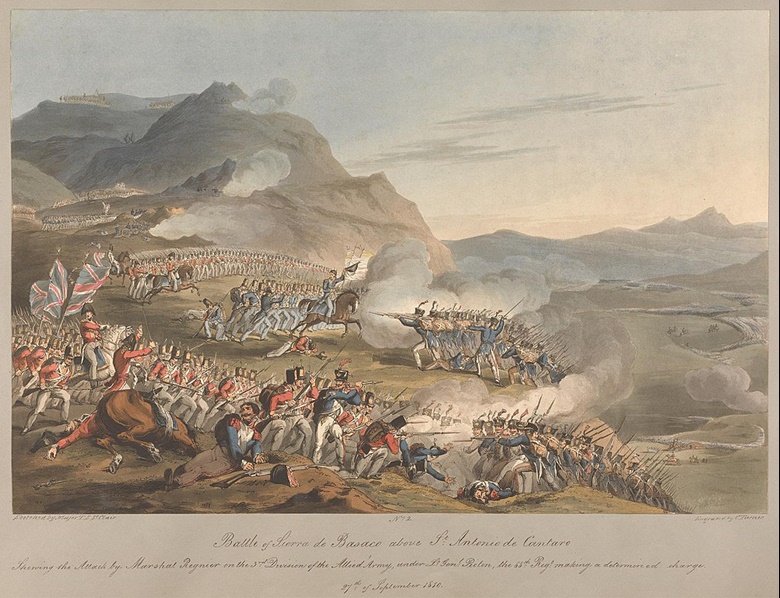After the capture of Almeida, we remained in our camps for another fifteen days and were only occupied with gathering supplies for the third expedition to Portugal. On 14 September, a review was held in the vicinity of Almeida: it was there that one should have seen our army to get an idea of the appearance of our regiments. In spite of five months of bivouac and hard work, contentment, ardour and desire for glory were evident on the faces of every soldier. The youngest had three years of service; what could we not have done with such men!
The army, 60,000 infantrymen and 12,000 cavalry strong, set out on 15 September, VI and VIII Corps by Colorico and Viseu, II Corps by Guarda. At first we crossed superb valleys and magnificent villages, but it was impossible for us to spot a single villager. We found the explanation of this by discovering proclamations of the King of Portugal on the walls, enjoining all the inhabitants and peasants to evacuate the towns and villages, on pain of death. The English army was withdrawing as we advanced and in spite of this, after marching for seven days, we halted for five days; I have never been able to find out the reason for this pause. Our soldiers took advantage of this to fill their bags with corn and rest a little.
On the 24th of September we set off again, and on the 26th our cavalry exchanged the first (carbine) shots with the English rearguard. We knew that the Anglo-Portuguese army was moving towards a mountain range called Mount Bussaco, which we could discern. The next day, 27 September, we had not covered a league when we found the English vedettes and saw the enemy army positioned on the heights. We halted and Marshal Ney moved to within fifty paces of these vedettes to reconnoitre the English position. On his way back, he halted near my voltigeurs who were already skirmishing in the brush and said to one of his aides-de-camp: ‘Go and warn the Prince of Essling that the enemy army is in position and seems to plan to oppose our passage; tell him that my intention is to attack as soon as the troops arrive.’ However the day passed without a shot being fired. We bivouacked, but food was lacking and several of our men had to go to sleep without having eaten anything but a few crushed corn seeds.
The next morning the men took up arms at dawn and, at 6 o’clock, they marched towards the enemy, on an empty stomach, with the same gaiety as if they had just enjoyed the best meal. Masséna said to the soldiers who marched in front of him: ‘Don’t waste your cartridges, attack with the bayonet!’ They obeyed him and charged with the utmost vigour. The brigade had to climb steep rocks and cross the thorny and almost impenetrable brooms which covered the mountain, under the fire of the English who were comfortably established on the summit. The two regiments marched towards the same height and a struggle soon ensued between the soldiers of the 69th [Regiment] and those of the 6th Léger to get there first. We quickly reached the foot of the enemy masses and halted under a rolling fire which was rather bothersome. In spite of the losses, my voltigeurs, in excitement, shouted to the English: ‘Hey, you Goddem, wait for us a moment to have luncheon!’
But, inconceivably, we noticed at that moment that the brigade was not supported; I immediately realised that the battle had been lost. On our right, Simon’s Division of VIII Corps, which had already reached the top of the heights and was also unsupported, was coming down the slopes under a terrible artillery fire while facing the attack of an English column that was four times larger. Suddenly this same column came upon us and it was our turn to be overwhelmed. However, this did not come about without resistance and the English did not get very far, for we spent all our cartridges on them. Sergeant Roussel, one of the battalion’s fusiliers, found himself alone, seriously wounded, in the midst of Scotsmen who wanted to take him prisoner; he knocked out two of them with the butt of his musket and put the others to flight.
On our left, General Reynier succeeded three times in seizing the crest of the mountain and was expelled from it by the same column which had driven us back. From there, the English, at liberty to advance, now moved from the right to the left to repel our disjointed assaults.
This fatal affair cost the Army of Portugal 10,000 men; the 69th lost 60 men killed and 500 wounded, including 26 officers. And yet the report of the general-in-chief represented this deadly day as a mere skirmish, intended to amuse the English, while our army turned the position to the right. I am ashamed to say that vile adulators dared to claim that it was one of Masséna’s most brilliant manoeuvres …
Source : Campagnes du capitaine Marcel, du 69e de ligne, en Espagne et en Portugal (1808-1814), Plon-Nourrit, 1913, pp. 114-118.

Leave a comment